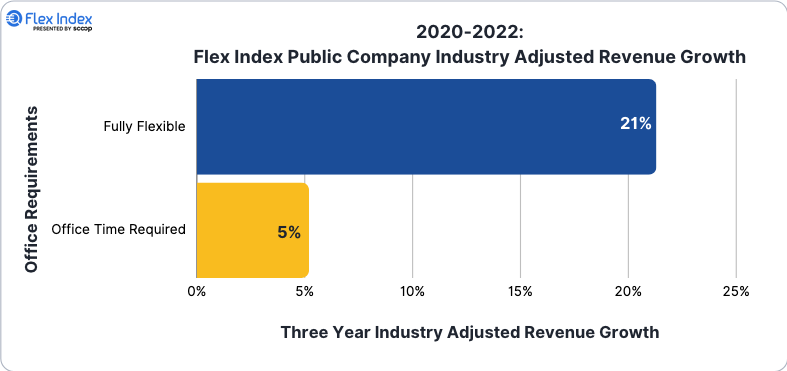Companies With Flexible Remote Work Policies Deliver More Revenue Growth: Report
Flex Index Report: 62% US Companies Embrace Flexible Work, Boosting Revenue by 16%. Trends in Remote, Hybrid Models Transform Corporate Performance, Productivity.

As someone who's been jerked around with return to office requirements over the past year by executives with lacking justification, I'm always on the lookout for hard data on the issue. The Flex Index Report, a comprehensive study presented by Scoop in collaboration with the Boston Consulting Group, sheds light on this transformation, specifically focusing on the adoption of flexible work arrangements and their impact on company performance.
Key Takeaways from the Flex Index Report:

- Growth of Flexible Work Policies:
- The report reveals that 62% of U.S. companies now offer work location flexibility. This marks an 11-point increase since the start of 2023, indicating a significant shift towards more flexible work environments.
- Impact on Revenue Growth:
- A standout finding is that Fully Flexible public companies outperformed their peers by 16 percentage points in revenue growth from 2020 to 2022, even when excluding the tech sector. This suggests that flexibility in work arrangements may be a key driver in enhancing a company's financial performance.
- Trends Among Younger Companies:
- The data highlights that younger companies, particularly those founded after 2010, are more likely to adopt flexible or Fully Remote work policies. This trend is not confined to the tech industry but is observed across various sectors.
- Structured Hybrid Models:
- The majority of Structured Hybrid companies require employees to be in the office about 50% of the time. This model, combining in-office and remote work, has become increasingly prevalent, aligning closely with the current occupancy rates found in Kastle’s data.
- Regional and Industry Variations:
- Flexibility varies significantly by region and industry. The report notes that small companies and those in the tech, media, and finance sectors are more likely to offer flexible work options. Geographically, companies in the West and Northeast United States are more flexible compared to other regions.
- Perceptions of Productivity:
- Despite differing opinions on remote work productivity, many employees feel more productive when working from home. This perception aligns with the trend of companies shifting toward more flexible work models.
Implications for the Future of Work:
The Flex Index Report indicates a clear trend towards greater flexibility in work arrangements. This shift is not just a reaction to the pandemic but a strategic move that can impact a company’s bottom line positively. As we approach 2024, the report suggests that we may continue to see a decrease in Full Time In Office requirements, with Structured Hybrid models potentially becoming the dominant approach to office policies in the United States.
Adding the non-company returns to these findings truly makes RTO untenable. If I'm saving 1-2 hours a day not commuting, gaining that time back with friends and family and my company is seeing more revenue growth, in what world does it make sense to push RTO. Unsurprisingly, findings seem to further support that RTO is more about control and poor leadership skills than anything to do with running a successful business.





